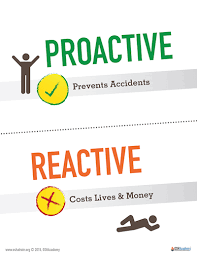Proactive vs. Reactive Type of Management
Proactive and reactive management are two contrasting approaches to handling situations and making decisions. Let's explore the characteristics of each type:
- Proactive Management: Proactive management focuses on anticipation, preparation, and taking the initiative to prevent problems or capitalize on opportunities before they arise. Key features of proactive management include:
a. Future-oriented: Proactive managers think ahead and envision potential challenges or opportunities that may arise in the future. They prioritize planning, goal-setting, and developing strategies to achieve desired outcomes.
b. Preventive measures: Proactive managers take preventive actions to avoid problems or mitigate risks. They identify potential issues, analyze their causes, and implement measures to address them proactively.
c. Strategic decision-making: Proactive managers make decisions based on a long-term perspective. They consider the broader context, industry trends, and potential impact on the organization's goals. They seek to align their actions with the organization's vision and mission.
d. Continuous improvement: Proactive management involves an ongoing commitment to improvement. Managers actively seek feedback, monitor performance, and make adjustments to enhance efficiency, effectiveness, and overall organizational performance.
- Reactive Management: Reactive management, on the other hand, involves responding to situations as they occur, often hurriedly or unplanned. It is characterized by the following:
a. Crisis-driven: Reactive managers tend to be more focused on addressing immediate problems or emergencies rather than considering long-term implications. They may lack preparedness and be caught off guard by unforeseen events.
b. Firefighting approach: Reactive managers often find themselves putting out fires or dealing with the consequences of neglected issues. They handle situations as they arise, rather than proactively working to prevent them in the first place.
c. Short-term perspective: Reactive managers may prioritize short-term gains or quick fixes over long-term strategic planning. Their decision-making is driven by immediate circumstances, which can limit their ability to achieve sustained success.
d. Limited control: Reactive management may result in a loss of control over situations, as managers are constantly reacting to external events rather than proactively shaping them. This can lead to a sense of being overwhelmed and struggling to stay ahead.
In summary, proactive management emphasizes foresight, planning, and prevention, while reactive management is characterized by responding to situations as they occur. While both approaches may have their time and place, proactive management generally promotes more stability, strategic decision-





